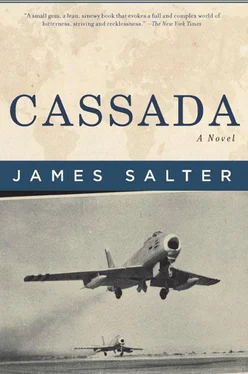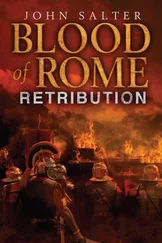“That’s right. You unscrew the clock.”
“The clock?”
“For a souvenir. Just put it in your pocket and bail out.”
Cassada was uncertain whether or not to smile.
“Now, if something happens up there while we’re flying along,” Grace said, “and you hear me tell you: ‘Forget the clock,’ you know what that means.”
Cassada nodded numbly. He heard a puff of laughter from the hearts game. His face was already red.
“It means get out right now,” Grace said. “Don’t wait. Go without it.”
They began to review the mission card after that. Cassada had made up his mind about Grace. He admired him.
“I forget what’s been played, it’s been so long,” Harlan was complaining. As it happened, he had the spade queen. He never passed it unless there was no choice. He was hard to beat. He nearly always passed diamonds or the ace or king of spades.
Outside the sun was up and the sky pale blue. After he had inspected his own ship, Grace walked over to Cassada’s and stood partly on the wing to supervise the start. Cassada hit the start switch. The rising whine began and then the full flow of sound, solid, deeper, as the engine swelled to life.
“That’s good!” Grace shouted.
Cassada, intent on the instruments, watched the various needles that had suddenly, ominous as serpents, raised their heads. He felt a tap on his shoulder.
“That’s good!” Grace cried close to his ear. “I’m going to mine now.”
With that, he jumped down and went quickly to his plane. As he was strapping himself in he looked over at Cassada whose head was turned in his direction, like a dog told to stay. It was a beautiful morning, sunlight, good visibility. Grace started his engine. He motioned for the power cables to be pulled and on the radio said, “Fortify Black Lead.”
“Black Two,” came the prompt reply.
“Go ahead, call the tower.”
Cassada tried, but there was no answer. He tried a second time and a third. Then, as if uncertain, he waited.
“You might try them on tower frequency,” Grace said. He could see Cassada, after a moment’s hesitation, bend down to see what channel he was on.
“Black, go Channel One,” Cassada finally said.
“That’s better.”
They had no further trouble. Grace behind, they taxied out. Many eyes were on them casually, some like Isbell’s, attentive. Together the planes lined up on the runway, black smoke mounting behind them, and then the first plane began to roll, slowly at first, then faster, Grace, in the chase plane, close behind. The powerful sound, as thick as if it were metal, lay over everything.
Grace, responsible for the supervision on this first flight, watched the arrowy shape in front of him lift and leave the ground with a slight unsteadiness. He saw the gear retract, the flaps, and the speed increase. He was connected to the plane ahead by a single filament finer than silk and no stronger: the invisible link that carried his voice. Usually he said little. There were pilots who, like women, talked a lot on the radio, but Grace said only what was necessary. He was highly regarded as a pilot and as the only flight commander below the rank of captain. He watched as Cassada climbed and at altitude began the stalls. Straight ahead, in a left turn, a right. Then the steep turns. Whatever the card said—there was not much on that first one.
Grace was flying off to the side and began a gradual turn away when Cassada had finished. “OK, join up, Black Two,” he said.
He watched as the other plane, closing too fast, swept above him, banking steeply. Its speed brakes came out. Grace continued a gentle turn. The other plane had dropped back and hung there on the inside, trying to cut him off. It took a long time. Grace saw what the trouble was. “Speed brakes,” he called.
They were pulled in right away. A few moments later, not to Grace’s surprise, Cassada went sailing past.
“Settle down,” Grace said.
Finally Cassada came into close formation. Grace let him establish himself and then began a turn, and another. Cassada stayed in position. Grace made them steeper. Eventually they were vertical, even beyond. Then he pulled up so Cassada was looking into the sun and held it there while the airspeed drained away. He rolled onto one wing and headed down. At about five hundred knots he began a hard turn, steady and solid. Cassada stayed in close.
“Let’s try some trail,” Grace said.
He watched as Cassada dropped back and swung in behind.
“Closer. About half a ship-length.”
He was looking up into the rear-view mirror, and after some moments Cassada’s wingtips appeared which meant he was in the right position, but then they fell away. He waited until they returned, easing back in, not too steady but remaining there. Watching them he made a turn, first one way, then the other, then pulled the nose up and did a roll. The wingtips were visible until just at the end. They vanished but came quickly back. Grace did the same thing again, making the turns faster. The wingtips bobbed but stayed in sight.
In Grace could be found all the qualities desired in a flight commander, or almost all. He was levelheaded and able and judged the men around him by a single standard, so simple it was sublime: could they fly? He did not put himself above them save in this one regard. It was the one thing that mattered.
He had almost forgotten who he was flying with. He dropped the nose and let it build up speed. The wingtips were jerking. Grace pulled up sharply and continued, straight up, onto his back. Just past the top of the loop, as he expected, the ship behind him fell back. He finished the loop and waited for Cassada to move in again. Then he did another. It was about the same. He rocked his wings and waited. Cassada slid to the side and slowly pulled into close formation. Grace said,
“How much fuel do you have?”
The reply was garbled. He asked a second time. He heard, “Twelve hundred pounds.”
“Go ahead and practice your landing pattern,” Grace instructed.
At ten thousand feet, well above the ground, Cassada did two of them. They looked good.
“All right, take us back to the field,” Grace said.
They were to the south of it. Cassada first headed west but soon corrected. With Grace trailing behind, he found the field and entered the pattern and instead of landing made the required go-around, requesting closed traffic.
“You’re cleared for closed pattern and landing,” the tower replied.
One after the other the two planes came down and landed. Isbell was watching from mobile control. He drove in to talk to Grace afterwards.
“The landing was good,” he said. “How was he in the air?”
“Not too bad.”
“No difficulties? Nothing dangerous?”
“No. He’ll be all right, I think. I’ll take him.”
“We haven’t decided about that,” Isbell said. “Where is he, anyway?”
Someone came around the side of Maintenance, arms held out oddly like a shirt on a clothesline. The flying suit, clinging and wet, was sheathed against his legs and chest. It was Cassada. He’d gotten sick to his stomach while in the air and in the midst of things had thrown up, catching it in one of his flying gloves but afterwards it spilled. He’d been in the latrine trying to wash himself off, but the smell was still there.
“What happened?” Grace said.
“I’m OK.”
“Go on back to the quarters and change,” Isbell said.
“I’m all right,” Cassada repeated. His face was grey.
“I’ll fill out a card,” Grace said. “There’s not that much to say. It’s an easy flight. You waited a little too long after takeoff, let the airspeed build too much before you began your climb. Do you have any comments?”
Читать дальше












